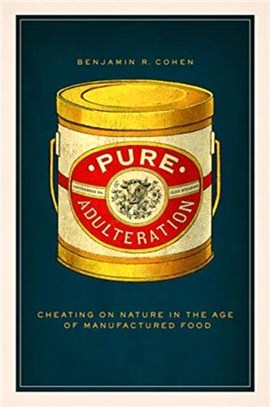目前查詢
歷史查詢

Pure adulteration :cheating on nature in the age of manufactured food /
- 館藏(1)
- 書目資訊
- 心得(0)
- 機讀格式
- 標籤
書名 : Pure adulteration :cheating on nature in the age of manufactured food /
紀錄類型 : 書目-語言資料,印刷品: 單行本
正題名[資料類型標示]/作者 : Pure adulteration :Benjamin R. Cohen.
其他題名 : cheating on nature in the age of manufactured food /
其他題名 : Cheating on nature in the age of manufactured food
作者 : Cohen, Benjamin R.
版本項 : Pbk. ed.
出版者 : Chicago ;University of Chicago Press,2021, c2019.
面頁冊數 : xv, 315 p. :ill., maps ;23 cm.
附註 : "A number of maps included throughout this book refer readers to https://purefood.lafayette.edu/. The maps included here are static versions of a larger series of dynamic maps tracing changes in various features of the three main cases in this book between the 1870s and 1910s. Readers should refer to that site for further maps and images from the book."
內容註 : The appearance of being earnest -- The culture of adulteration -- Surfaces and interiors -- Household, grocer, and trust -- The geography of adulteration -- Margarine in a dairy world -- Oil without olives and lard without hogs -- Glucose in the empire of sugar -- The analysis of adulteration -- Analysis as border patrol -- Food and the government chemist -- Epilogue: the persistence of adulteration.
標題 : Food adulteration and inspection
ISBN : 9780226816746
LEADER 03274cam a2200277 a 450
001 1164704
008 230926r20212019iluab e b 001 0 eng d
010 $a 2019017188
020 $a9780226816746$q(pbk.) :$cNT$846
035 $aNO000233926
037 $b公共圖書館臺南分區資源中心
040 $aICU/DLC$beng$cICU$dDLC$dTWTNM
050 00$aTX515$bC65 2019
082 0 $a363.192640973$223
090 $a臺南市立圖書館
100 1 $aCohen, Benjamin R.
245 10$aPure adulteration :$bcheating on nature in the age of manufactured food /$cBenjamin R. Cohen.
246 30$aCheating on nature in the age of manufactured food
250 $aPbk. ed.
260 $aChicago ;$aLondon :$bUniversity of Chicago Press,$c2021, c2019.
300 $axv, 315 p. :$bill., maps ;$c23 cm.
500 $a"A number of maps included throughout this book refer readers to https://purefood.lafayette.edu/. The maps included here are static versions of a larger series of dynamic maps tracing changes in various features of the three main cases in this book between the 1870s and 1910s. Readers should refer to that site for further maps and images from the book."
500 $aReprint. Originally published: 2019.
504 $aIncludes bibliographical references (p. [283]-302) and index.
505 0 $aThe appearance of being earnest -- The culture of adulteration -- Surfaces and interiors -- Household, grocer, and trust -- The geography of adulteration -- Margarine in a dairy world -- Oil without olives and lard without hogs -- Glucose in the empire of sugar -- The analysis of adulteration -- Analysis as border patrol -- Food and the government chemist -- Epilogue: the persistence of adulteration.
520 $aIn the latter nineteenth century, extraordinary changes in food and agriculture gave rise to new tensions in the ways people understood, obtained, trusted, and ate their food. This was the Era of Adulteration, and its concerns have carried forward to today: How could you tell the food you bought was the food you thought you bought? Could something manufactured still be pure? Is it okay to manipulate nature far enough to produce new foods but not so far that you question its safety and health? How do you know where the line is? And who decides? Benjamin R. Cohen uses the pure food crusades to provide a captivating window onto the origins of manufactured foods and the perceived problems they wrought. Cohen follows farmers, manufacturers, grocers, hucksters, housewives, politicians, and scientific analysts as they struggled to demarcate and patrol the ever-contingent, always contested border between purity and adulteration, and as, at the end of the nineteenth century, the very notion of a pure food changed. Purity became a scientific rather than environmental concept--one based on analyzing the product instead of the process. In the end, there is (and was) no natural, pre-human distinction between pure and adulterated to simply uncover and enforce; we have to decide. Today's world is different from that of our nineteenth century forebears in many ways, but the challenge of policing the difference between acceptable and unacceptable practices remains central to daily decisions about the foods we eat, how we produce them, and what choices we make when buying them.
650 0$aFood adulteration and inspection$zUnited States$xHistory$y19th century.
650 0$aFood adulteration and inspection$zUnited States$xHistory$y20th century.
653 $a樂活環保
653 $a知識性
